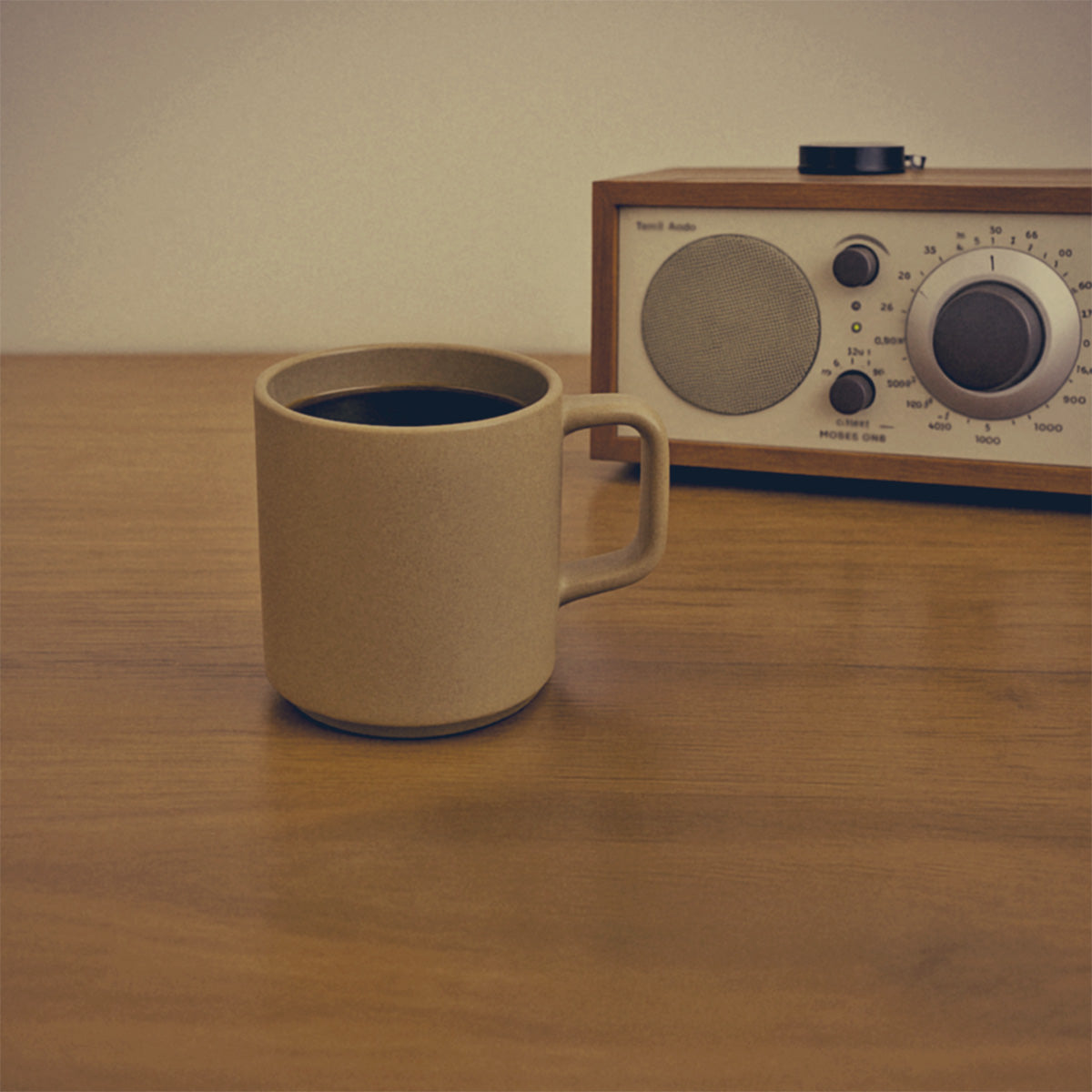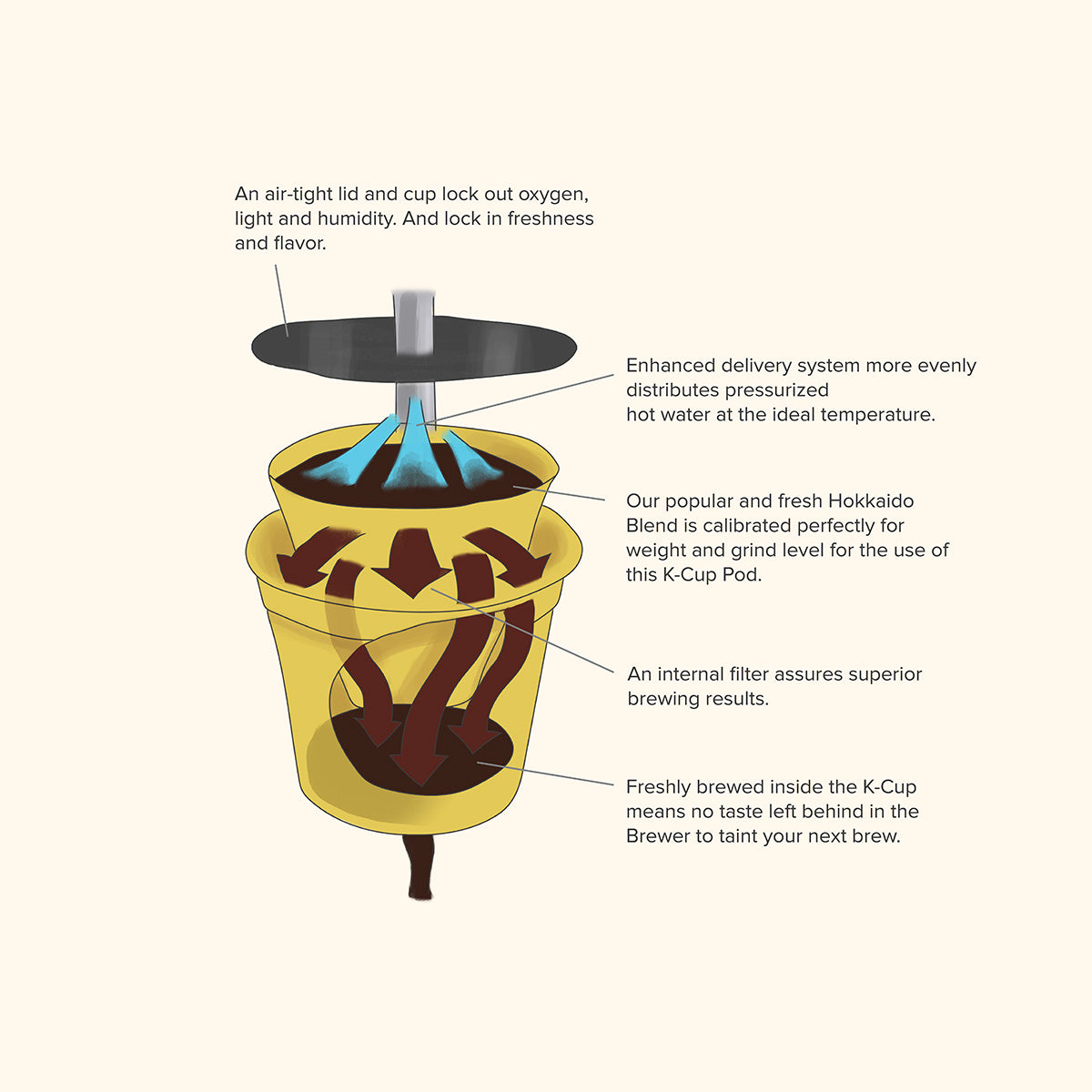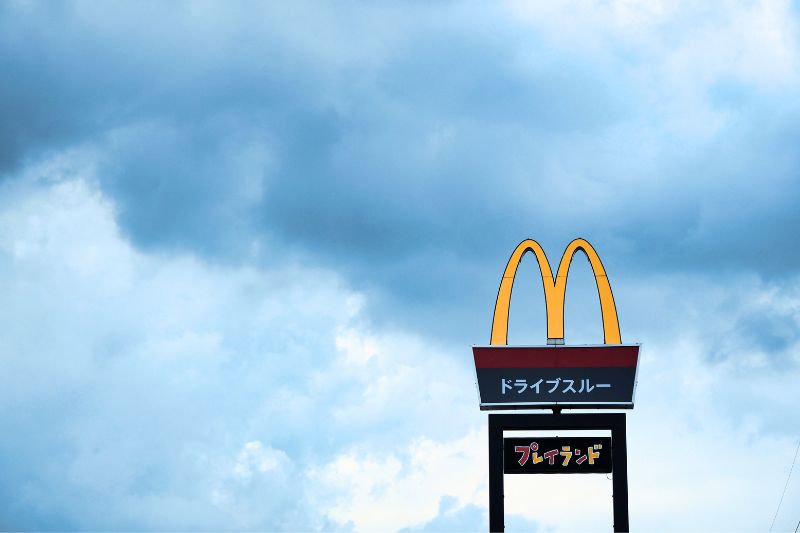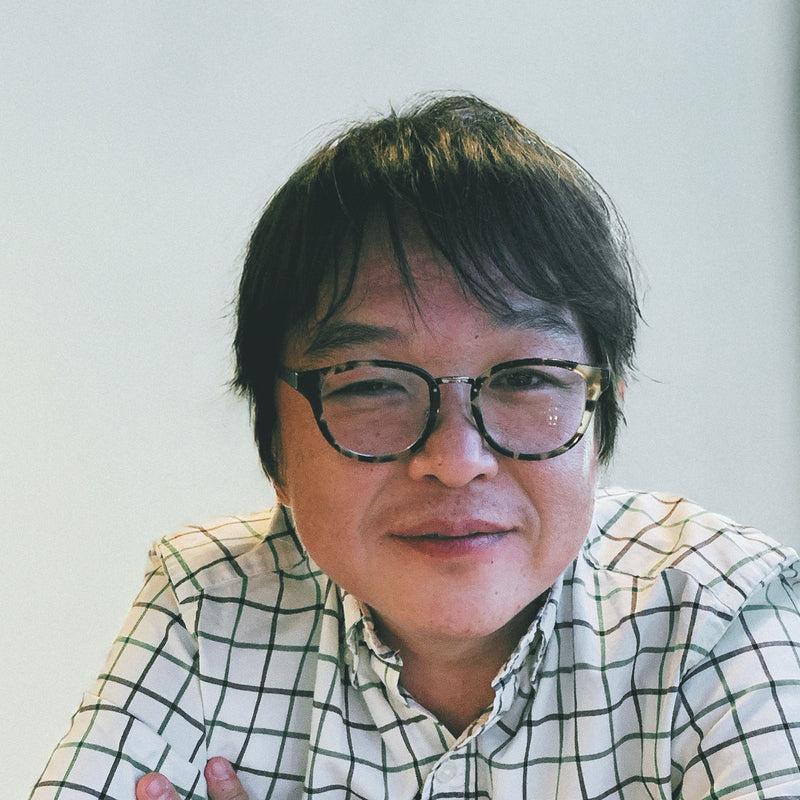We can all agree that a lot is known about the Japanese tea culture but what about coffee and cafes in Japan? The history of coffee in Japan goes back to the 1700s when it was brought to the island by Dutch and Portuguese traders. The first coffee shop in Japan was opened in 1888, more than 150 years ago. Since then, a lot has changed in the Japanese café culture. Some trends endured the test of time, and some traditions have become obscure, but one thing is for sure - Japan's café scene is constantly evolving.

When it comes to categories or "types" of cafes, Japan probably offers the widest range of variations. You can find standard chain coffee shops, Kissaten (traditional Japanese café), third-wave specialty cafés (usually part of a coffee roaster), animal café (where you can pat and play with animals), maid café, character-themed café, music café, book café, and the list goes on and on.
With so many different kinds of cafes, it is very difficult to find a truly unique café that offers not only originality but also an outstanding quality in terms of coffee, food, service, and interiors; a café that is worth a visit (or multiple visits for that matter) and has the caliber to meet the standards of a person who is passionate about coffee. Hence we have carefully selected five unique cafes in Japan that we think deserve special attention and should be top priority on your bucket list if you are a serious coffee lover.

Sabouru (さぼうる)
Sabouru is arguably the most unique café in Japan, with a status similar to a cult-favorite among coffee lovers who seek uniqueness when it comes to a café experience. You might be wondering "Well, it does have an interesting name, but what is so special about it?" And the answer to that would be - "Everything."
 Image from Exploring Old Tokyo
Image from Exploring Old Tokyo
Everything from its mysterious interiors to its mesmerizingly beautiful cream sodas, Sabouru is a true enigma – it is beyond being described in simple terms and impossible to pinpoint under one category. That being said, we are going to take a close look at the different aspects of this café which all come together to make this a place that anyone should visit at least once in their lifetime.
A legacy of more than 65 years!
The sheer fact that it has been going strong and running under the same owner for more than 65 years is undeniable proof to the fact that it offers its guests something truly original that cannot be found anywhere else. It was founded in 1955 and many visitors say that the café has a “frozen in time” feel to it. However, do not assume that it attracts only older and loyal customers, the café is very popular with people of all ages and foreigners and locals alike. You never know who you might meet in this café – it might be a writer, artist, young couples, college students, tourists, or busy office workers; the beauty of a café like this is that it brings people from all walks of life under one roof and creates the chance for incredible human encounters.
As you can imagine, a coffee shop that has been open for so long has a rich history which is reflected in its interiors, quite literally, in the graffiti style writing on its brick walls (but we will talk more about that in the interior section), and also in the expertise and wisdom of the owner of the café, who is more than 85 years old but is still looking after the café with his inextinguishable passion and devotion to his café and his guests.
Located at the heart of Jimbocho – one of the best antique book towns in the world
Sabouru and Sabouru-2 (More about this in a different section) are conveniently located at a less-than-a-minute walk from Jimbocho Station’s A7 Exit. You can practically see the shop signs if you look over your shoulders when you come out of the station exit. Ever heard of Jimbocho? Well, now you have, and if you are a bibliophile, you will be putting this place on your bucket list of must-visits.

Image from Visit Chiyoda
This is the ultimate book town of Japan, located in Chiyoda ward of Tokyo. The place is known to be the mecca for book stores, antique and curio shopping and is also home to some of Japan’s most famous publishing houses. It is also close to several universities, and all of this means that this town is a sprawling hub that attracts free-thinkers, artists, scholars, intellectuals, antique collectors, readers, writers, and of course – Coffee lovers, from all over the world.
You can make Sabouru your first stop at Jimbocho to have your breakfast and coffee before you start exploring the town or you can make this your final stop to enjoy a relaxing cup of afternoon coffee - or maybe even both!
The fact that Sabouru has existed in this town for more than 65 years means that it has served many famous writers and artists from this area. It is fascinating to sit inside Sabouru and to wonder over a cup of coffee, who else might have sat at the same seat that you are on, and what they might have been thinking, writing, or creating while having their coffee!
A rule-defying yet tasteful interior and a magical atmosphere
From the entrance to the semi-underground seating area, the interior and the decoration of Sabouru are nothing like you have seen before. It is a masterful blend of Western design, kitsch style, tiki-themes, Native American items, and also features of Japanese Kissaten (traditional Japanese tea and coffee house). One might question whether throwing in pieces from so many different and seemingly contradictory cultures work in favor of creating a relaxing atmosphere for a café but the surprising thing is that the owner of Sabouru has achieved that seemingly impossible feat!
The atmosphere of Sabouru has been described as being something out of a Studio Ghibli movie, Harry Potter, the Showa era, or Haruki Murakami’s works. You get the point – it’s out of this world and magical.
At the entrance, you will notice a vivid red antique dial-phone, a hand-crafted shop sign in Japanese, a tall totem pole, and a wooden façade that would remind you of a mountain lodge. Inside, there is a semi-underground floor, a first floor, and a second floor and the uniqueness of the decorations encountered at the entrance extends all the way to every corner of all three seating areas.
One of the most iconic parts of Sabouru’s interiors is a brick wall with hand-written graffiti by the guests. It was not created on purpose but has been started by the guests themselves and has become part of the interior design over the course of time. You will find statements of eternal love written by couples, liberal thoughts by students who were part of student movements in the 60s and the 70s, poems, small messages and comments, and countless other things. Reading through these is like taking a walk down a collective memory lane.
The ambiance inside the café is dark, cozy, and very relaxing. The dark brown interiors and the proximity of the tables make you feel like you are inside a secret society in a cave. You can come here and unwind on your own, read a book, have a relaxed chat with a friend, or simply enjoy your coffee.
Fun fact: Some scenes of the famous Japanese drama movie Shitsurakuten (Lost Paradise), 1997, were shot inside Sabouru.
The story behind the name “Sabouru”
The whole picture of Sabouru would be incomplete without knowing the meaning behind the name of the café. Sabouru sounds very similar to the Japanese word “Saboru” which means to skip/bunk school or work, or to slack off. Given the fact that many office workers and university students have been regular guests of Sabouru, coming here to spend a relaxed time, it is thought commonly that the name came from that idea. However, the fact is that the name was originally based on the Spanish word “Sabor” which translates to flavor or taste. The only thing that can be said for sure is that Sabouru is a combination of both of those words and much more.
Sabouru, Sabouru 2, and must-try Items on the menu
We have mentioned Sabouru 2 in the earlier section and you must be curious to know more about it. It is right next door to Sabouru and has the same owner so you can expect the same welcoming atmosphere and quality of taste and service you can find in the original Sabouru. The main difference is that Sabouru 2 is more focused on food rather than drinks and it can get very busy during the lunch hours. As the two shops are at a distance of only a few steps from each other, we would recommend you to enjoy your meal at Sabouru 2 and go to Sabouru for a relaxed time afterward.

Image from Trip 101
Sabouru offers a Kissaten-like menu for example the breakfast set menu. We have selected some of the most popular items that you can try on your visit to Sabouru.
Coffee:
Sabouru uses a blend (not single-origin) to make their coffee and it is known among the regulars to be rich, dark, and well-balanced. One reviewer has said, “Sabouru’s blend coffee has just the right amount of bitterness, acidity; its taste and aroma make you feel nostalgic.” Many also recommend trying their iced black coffee.
The most interesting about having a cup of coffee at Sabouru is that it comes with a free side of peanuts! Another thing is that one of the tableware that has been used at Sabouru from the time of their establishment in 1955 is their milk pitchers. So you can order your coffee with milk on the side just to have a look at what milk pitchers from 1955 look like!
Cream Soda:
Cream soda is a drink popular in Japan and consists of a scoop of ice cream floating on a glass of flavored fizzy soda. Sabouru offers not just one, but six (!) different soda colors to choose from. The drinks are beautiful as well as refreshing and make you feel like you are drinking a magic potion.
Fresh Strawberry Juice:
This is Sabouru’s iconic drink and the recipe has been perfected by the owner himself. It is very refreshing with a rich taste, flavor, and bits of real strawberries inside.
Sabouru-2
Napolitan Spaghetti:
This is a Japanese take on the Spaghetti with a tomato-based sauce and one of the most popular items for lunch at Sabouru-2. It is also famous for the generous portion of side salad that comes with it.
A word from the owner
Master Suzuki, who is more than 85 years old has been running Sabouru for more than 65 years since its establishment in 1955. Here is his answer when he was asked “What does Sabouru mean to you” in an interview.
“It might sound dramatic, but it is my life. A café cannot go on without the support of its customers. I am happy that they continue coming to the café.”
Address:
1-11 Kanda Jinbocho, Chiyoda-ku, Tokyo

Ihatoubo (いーはとーぼ)
Ihatoubo is a long-established Kissaten and is one of the best-kept secrets of Shimokitazawa – a hip Tokyo suburb that is known for thrift-store shopping, a lively art and music scene, and for its indie, bohemian vibes.
Much more than just a café -the unique concept that makes it so special
Although it is called a Kissaten, Ihatoubo is much, much more than that. It is at the same time, a Kissaten, a book café, a music café, a record store, a library, and a creative space where you can enjoy books, music, and art, accompanied by great coffee, drinks, and light meals. The sign of Ihatoubo reads “Coffee and Music” in Japanese and the owner, who has been running the shop since 1977, has been an art critique and a publishing editor before he opened this shop. He is still passionate and highly knowledgeable about coffee, music, publications, art, and culture which is clearly visible in the way the shop is designed and run.
Right beside the entrance door, there is a pleasantly chaotic and colorful board covered in flyers and posters of various artistic and cultural events. At this point, you will already be able to hear the music coming through the door from the inside, and it is one of the unique characteristics of this Kissaten – Music is not used as a background effect for creating an ambiance but it takes the center spot at this cafe, and hence, it is played at a volume louder than the usual Japanese standards.

Inside the café, there are bookshelves stacked with books of different genres, and you can browse through these and read them at the café. There are also dedicated spaces displaying albums, vinyl records, CDs, and magazines, and these consist of both new and antique items. They are also categorized with helpful hand-written labels made by the owner himself. You can buy these or simply enjoy looking through them. At the tables there are hand-written notes that say “Feel free to ask the owner about the CD being played", and it shows what a great place this is for not only enjoying the music you might already know but also to discover new artists and genres.
The motto of Ihatoubo according to the owner:
“The motto of this shop is Genki (Lively), Nonki (Easy-going), and Sunao (Honest)”
A warm and welcoming interior
Ihatoubo is tucked away inside a building and it is not at the ground level. This might be one of the reasons why it has remained a well-kept secret even though it has been there for more than 40 years. You have to climb a flight of narrow stairs and on the first floor of a building is the entrance door. Once inside, you will be surprised at how different it is from the exteriors of the building within which it is located. The walls, shelves, seats, and tables, are all made of wood – making the whole place very warm and welcoming. It is reminiscent of a home library or a cozy club room. Since it is on the first floor, you can choose to sit at a window seat and enjoy watching the street and people going on about their lives in Shimokitazawa.
Shimokitazawa - A little bit about the town Ihatoubo is located in
Many loyal customers of Ihatoubo describe Ihatoubo to be a real representative of the spirit and essence of Shimokitazawa. Although it is easily accessible, it is not as busy as Shibuya or Shinjuku, and its bohemian and indie atmosphere is quite refreshing. This is a place where independent retailers, artists, and creators have thrived, and is also a place rich in the prevalence of sub-cultures. It has an atmosphere that inspires the expression of individuality through art and culture. The non-mainstream Jazz music being played at Ihatoubo, the louder-than-usual music volume, and the flyer-crammed entrance might all be conceived as a little too strange at other parts of Tokyo, but that is what Shimokitazawa is about: unrestrained self-expression and love for art and culture, which Ihatoubo captures perfectly.
Recommended Item on the Menu
When it comes to food and drinks, Ihatoubo serves specialty coffee, coffee-based drinks like cappuccino, as well as other hot drinks such as hot cocoa and tea. Apart from that, it also serves alcoholic drinks such as Gin tonics, wine, and beer. For food, it offers light meals such as salad, cheese, and bread. The recommended and most popular item on their menu is coffee.
Ihatoubo’s Coffee:
The blend used to make coffee at Ihatoubo is based on Brazilian (Santos) and Colombian beans, which means it is less acidic and well-balanced with a sweet, chocolaty, and mellow finish.
The blend has been roasted in 4 different ways from which you can choose: The French Roast A, French Roast B, Italian Roast, and American Roast. According to the owner, the further south you go in Europe, the temperature used for roasting the coffee beans tends to get higher, which means the Italian Roast has the most bitter notes and tends to be described as being "strong". French Roast A of Ihatoubo is known for its rich aroma and depth of taste, and it has a buttery mouth feel on the first sip. French Roast B is a little more on the smokier side but retaining the aroma and taste of the Roast A. The American Roast offers a clean palate and a taste that is refreshing and not complex.
Once you have chosen your preferred roast style, your coffee will be made upon order by a pour-over process using a Melita drip, with lots of love and care.
Address
Tokiwa Building 2F, 2-34-9 Setagaya, Kitazawa City, Tokyo
Website (blog by the owner): www.ihatobo.exblog.jp/6184064/

Pronto
Established in 1988, Pronto is a Japanese chain café with more than 300 stores across Japan and several stores overseas, currently in Shanghai and Singapore. Although there are many chain cafes in Japan, there are many qualities of Pronto that make it stand out among the others.

Image from Pronto
The Italian Connection
“Pronto” – sounds Italian? Yes. Pronto in Italian means “ready” and Pronto is ready to serve its guests any time of the day – some stores of Pronto opens as early as 7 a.m. and stays open until almost midnight. Italy has a coffee culture that spans many centuries and Italian coffee is known for its rich, dark, taste, and smoky flavor. In Italy, coffee is an all-day affair. Starting from the morning shot of espresso to the post-dinner coffee, coffee is enjoyed in one form or the other on several occasions throughout the day. Pronto has done an excellent job of incorporating the best features of the Italian coffee culture into a chain café of modern and global standards.
The best of both worlds - A Café during the day, a bar in the evening
Whether it be the first shot of espresso in the morning, your mid-day takeaway cappuccino, or your cocktail drink after work – Pronto has it all covered. From early morning to evening, it is a café perfect for your work sessions, a brunch with your friends, or some quality time with a good book. But from afternoon to around midnight, it transforms into a relaxing Italian bar serving high-quality cocktail drinks, beers on the tap, and delicious food that pairs well with alcoholic drinks.
Things that make Pronto an outstanding chain café – it’s all in the small details
You might be asking, with so many different chain cafés to pick from, why Pronto? The answer is below.
- A wide range of options
Having options is very important in today's world. Pronto is very good at adapting and evolving its menu and services according to the needs of the guests. It offers a wide range of drinks in regular or large sizes and you can choose to have it inside the café or make it a takeaway. They offer a full set of espresso-based drinks such as latte, cappuccino, mocha, Vienna coffee, etc., and also all of these in the iced version. They also offer Soy and Oat milk as options to make your drinks with, which shows that they care about the preferences of their customers.
Apart from coffee, they also offer several different types of tea, including Masala chai, and Matcha-based drinks.
For food, they offer plenty of options – breakfast sets, several different kinds of pasta, and delicious sweet treats.
For this reason, you can visit Pronto with a group of people and be sure that nobody would have to feel left out. Even if you are going on your own, you can try different items on different days and never be bored.
- Convenience and Comfort
Pronto offers free WiFi and charging points inside the café. In today's world where it is practically impossible to go about our days without the internet and our electronic devices, this is a huge advantage for anyone who plans to spend time at a café. They also have washrooms and smoking areas. In Japan nowadays it is very difficult to find cafes and restaurants with smoking areas so the fact that Pronto offers a separate smoking area makes it a highly attractive option.
Comfort is another thing that you will find at Pronto. You can choose to sit at the table and chair seats if you want a quiet and distraction-free work session on your own, but you can also sit comfortably on one of their cushioned seats for a quality conversation with your friends. After all, the expression "Dolce far niente (the sweetness of doing nothing)” was invented by the Italians and Pronto offers a comfortable space to relax, unwind, and do nothing but enjoy your food and coffee if you feel like doing so.
- Efficient and consistent service
Any branch you go to, at any time of the day, you will find the same quality in terms of customer service, cleanliness, and the taste of food and coffee. The President of Pronto frequently visits the branches randomly and anonymously to make sure to check that the quality at the branch is maintained consistently.
Recommended Items on their menu
The first things you think about when it comes to Italian are Pizza and Pasta. Although Pronto offers pizza as well on their food menu, good pasta is what they are known for. They offer more than five different kinds of pasta dishes including mouth-watering options such as bacon and eggplants in tomato sauce, lemon carbonara, prawn and avocado in basil sauce, etc. This is what Norihiko Takemura, the President of Pronto, has to say about the pasta dishes at Pronto:

Image from Pronto's Facebook
“We don’t advertise ourselves as a pasta restaurant, so we don’t boast about it but Pronto sells the second most pasta dishes in Japan. That’s about 650,000 pasta dishes sold each month.”
You get the point.
Address
As they have more than 300 store locations across Japan, it is best to use the ‘store locator’ on their official website if you want to find the nearest store to visit.
Website: www.pronto.co.jp

Café Après-Midi (カフェ・アプレミディ)
Everything about this café, starting from its name based on the French word “Après-Midi”, meaning afternoon, is chic, stylish, and artistic yet at the same time, welcoming, warm, and relaxed. What comes to mind when you imagine a French afternoon? Lounging with tasteful music, good coffee and food, maybe some wines, and friendly company. Café Apres-midi offers all of these and much more. It is owned by Toru Hashimoto, a DJ, who has created many compilation CDs and Café Après-Midi is one of his compilation series, consisting of more than 30 different CDs. The music in the compilations is by various artists from all over the world – all tastefully curated from different genres by Hashimoto.

Image from Café Après-Midi
The café is located on the 4th floor of a building in Shibuya, which is a major commercial area in Tokyo, housing two of the busiest railway stations in the world. As you can imagine, this place is like a hidden oasis to rejuvenate your body and soul when you are tired of the crowded and busy metropolis.
Lounge, Music, and Art inspired interiors
Right upon entering the café, you will be welcomed by a modern, stylish interior with comfortably cushioned sofa chairs, bar seats, and warm wooden decors. One side of a wall is completely covered by compilation CDs created by Toru Hashimoto, the owner. According to the owner, he wanted the atmosphere of the café to make the guests feel like they were “chilling at the living room of a friend’s house who shares common hobbies and interests.”

Image from Café Après-Midi
They host various artistic and musical events, some of them weekly, such as “Friday Lounge” where guest DJs are invited and you have a great chance to meet people who are interested in music as much as you are!
Recommended Items on the Menu
Café Après-Midi offers a decent selection of coffee, tea, and cold drinks, as well as alcoholic drinks such as cocktails, wines, and beer. For food, although their selection is not broad, each item is well-made and worth a try.
Coffee
They offer hand-drip coffee, as well as espresso-based drinks such as latte and cappuccino. For the drip coffee, make sure to try their Café Après-Midi blend, which can be ordered hot or cold depending on your preference.
From the food section, make sure to check out their hand-written board for the "Today's special" menu or try their special Gelato made with Jersey milk and organic berry confiture.
Address
Address: Inter Bldg II 5F, 1-9-11 Jinnan, Shibuya-ku, Tokyo
Website: www.cafeapresmidi.wordpress.com/

Café Les Jeux Au Grenier (カフェ レ ジュ グルニエ)
If you want to travel through time and space to a retro café in Europe, all you have to do is to climb up a flight of stairs in Minato city of Tokyo that leads to Café Les Jeux Au Granier, a long-running Kissaten established in 1976. The concept behind the café was inspired by the owner’s trip across Europe during which he fell in love with European cafes with stone-built interiors. Everything about this place, including the interior, ambiance, coffee, and dessert, is at a different level of refinement and sophistication.
The name of the café comes from two French words – “Les Jeux” (meaning to play), and “Grenier” (meaning attic). Staying true to its naming, although this café is very classy and highly sophisticated, it does not sacrifice coziness or the feeling of personal space. You can relax and feel comfortable, on your own or with a company, just as you would feel in your attic.
The poetic atmosphere inside the café
If you looked at the café’s unpretentious staircase or the front façade of the building in which it is located, there would be no way you would imagine what lies beyond the entrance door. The atmosphere of this café is truly unlike any other. The interiors of the café have not been changed much since its opening more than 40 years ago. The stone-based architecture, the weathered wooden furniture, and the soft warm lighting create a nostalgic yet stylish atmosphere. The wooden tables, chairs, and bar seating areas all have a distinctly European look to them, and it is known that they have been bought by the owner from a flea market in Paris, at the time of the opening. Although this place might be hidden from the mainstream café-goers, the café’s unique architectural design and interior decoration have earned it a high status among those who are aware of it. Many famous Japanese designers and stylists are known to frequent this café. The interiors are darkly lit and this allows the natural light from outside to create an interesting play of shadow and light throughout the day, evoking different emotions depending on the sunlight coming through the windows. The atmosphere is nothing but poetic.
Coffee at Café Les Jeux Au Grenier
Café Les Jeux Au Grenier offers a unique selection of coffee drinks that are difficult to find at other cafes in Japan.
 mage from OMOHARAREAL
mage from OMOHARAREAL
First of all, it offers Nel-drip coffee (pour-over) and you can choose your coffee beans from single origins and coffee blends. There are plenty of options to choose from when it comes to single-origin such as Brazil, Kilimanjaro, Guatemala, Colombia, Mandheling, Blue Mountain, etc. although these might depend on availability. Out of the three different premium blends offered here, the most popular blend is the Les Jeux original blend which is based on Colombian beans and has a well-balanced taste and rich aroma. When it comes to coffee-based drinks, this café boasts of several rare items that are almost impossible to find at other Japanese cafes such as Café con Leche (a Spanish coffee beverage), Café Royale (a strong coffee cocktail), Irish Coffee, Vienna Coffee (Coffee with whipped cream), etc. and several other cold coffee drinks as well. The most popular among the coffee-based drinks is their Au Lait Glacé which is not only delicious but a beautiful sight to behold. Au Lait means “served with milk” and Glacé means “coated with sugar”. It is a cold coffee drink, usually served in a transparent wine glass with a clear visual distinction between the milk layer and the coffee layer. This drink truly is a work of art.
Recommended items on their menu
They have delicious savory items such as toast with sesame and Croque monsieur, which are great but if you are here for the first time, you should not miss out on the chance to try their delectable dessert items such as caramel pudding, Gâteau au chocolat, and baked cheesecake because their desserts when paired with their drip coffee, create an out-of-the-world experience.

Image from OMOHARAREAL
Address
Murayama Building 2F, 5-9-5 Minamiaoyama, Minato City, Tokyo
Final words
As you can see from the article, some of the most unique cafes combine art and culture along with coffee, which is not so surprising if you think about it. A great café is not only a place where coffee and food are served but it is a place where many great ideas are born, art is created, and people come together to build a community. Now that you know where to find these cafés in Japan make sure to visit them and you will surely find something truly unique and remarkable.
Get Free Bonus Books

Sign up for free to the Coffee Club to get advice and exclusive articles about how to choose Japanese Coffee, and tips, tricks, and recipes for enjoying Japanese coffee.
About the author
Kei Nishida
Author, CEO Dream of Japan
Certification: PMP, BS in Computer Science
Education: Western Washington University
Kei Nishida is a passionate Japanese tea and coffee connoisseur, writer, and the founder and CEO of Japanese Coffee Co. and Japanese Green Tea Co., both part of Dream of Japan.
His journey began with a mission to introduce the world to the unparalleled quality of Japanese green tea. Through Japanese Green Tea Co., he established the only company that sources premium tea grown in nutrient-rich sugarcane soil—an innovation that led to multiple Global Tea Champion awards.
Building on this success and his passion for Japanese craftsmanship, Kei expanded into the world of coffee, pioneering the launch of Japanese Coffee Co., the first company to bring Sumiyaki charcoal-roasted coffee to a global audience. His dedication to authenticity and quality ensures that this traditional Japanese roasting method, once a well-kept secret, is now enjoyed worldwide.
Beyond tea and coffee, Kei has also introduced Japan’s legendary craftsmanship to the world through Japanese Knife Co., making handmade katana-style knives—crafted by a renowned katana maker—available outside Japan for the first time.
Kei’s journey continues as he seeks out and shares the hidden treasures of Japan, one cup and one blade at a time.
Learn more about Kei












![Asa Tsuyu Blend [Light Blend] Coffee (Colombia, Brazil, Ethiopia)](http://japanesecoffeeco.com/cdn/shop/files/web-ready_Asa_Tsuyu_Blend_life-style.jpg?v=1754689231)
![Asa Tsuyu Blend Package [Light Blend] Coffee (Colombia, Brazil, Ethiopia)](http://japanesecoffeeco.com/cdn/shop/files/AsaTsuyuBlendpackage.jpg?v=1754689220)
![Asa Tsuyu Blend [Light Blend] Coffee Beans (Colombia, Brazil, Ethiopia)](http://japanesecoffeeco.com/cdn/shop/files/AsaTsuyuBlendcoffeebeans.jpg?v=1770838125)















